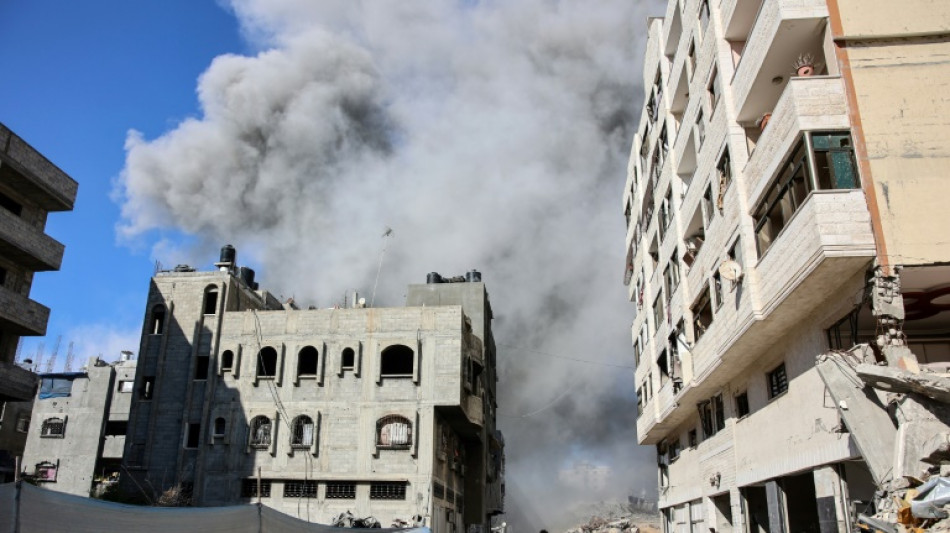

Truce hopes fade as Gaza rocked by Israeli bombardment, battles
Hopes were dwindling Thursday for a ceasefire in the Gaza Strip, where fighting raged despite US pressure on Israel and Palestinian militant group Hamas to reach an agreement.
After more than 10 months of war, officials from the United States and mediators Egypt and Qatar had been set to meet in Cairo for a new round of negotiations this week, but confirmation was still pending.
The war triggered by Hamas's unprecedented October 7 attack on Israel has devastated Gaza, displaced nearly all its population at least once and triggered a humanitarian crisis in the besieged Palestinian territory.
Diplomatic efforts have intensified to try to avert a wider war following the high-profile killings of two Iran-backed militants that sparked threats of reprisals from Tehran and its allies, which blamed Israel.
US Secretary of State Antony Blinken on Wednesday headed home from his latest tour of the Middle East, aimed at finalising a ceasefire, without a breakthrough.
In a phone call later, President Joe Biden pushed Israeli Prime Minister Benjamin Netanyahu to accept a deal, stressing "the urgency of bringing the ceasefire and hostage release deal to closure", the White House said.
It added that Biden also reassured Netanyahu of the efforts of the United States -- Israel's main ally and weapons supplier -- to support it against threats from Iran and its proxies.
Blinken on Thursday spoke with the Qatari emir, Sheikh Tamim bin Hamad Al-Thani, after the two were unable to meet during the US top diplomat's brief stop in Doha earlier this week.
They discussed the latest push towards a truce and "affirmed that no party in the region should take actions to undermine efforts to reach a deal", the State Department said.
A main sticking point remains Hamas's long-standing demand for a "complete" Israeli withdrawal from Gaza.
Netanyahu, whose hard-right coalition relies of the support of members opposed to a truce, said Israel insists on keeping forces on the Palestinian territory's border with Egypt.
- Israel opposes full withdrawal -
Israel "securing the southern border" of Gaza was crucial for achieving the war's objectives, his office said late Wednesday, rejecting as "incorrect" media reports that "Netanyahu has agreed that Israel will withdraw from the Philadelphi Corridor".
Government spokesman David Mencer later called the Gaza-Egypt border strip, which Israel says militants use to smuggle weapons, a "Hamas lifeline".
During his regional tour, Blinken said Netanyahu had accepted a US "bridging proposal" for a truce that "is very clear on the schedule and the locations" of the Israeli withdrawal.
Without mentioning Philadelphi directly, Blinken also said that Washington "does not accept any long-term occupation of Gaza by Israel".
Israeli newspaper Yedioth Ahronoth, citing "officials knowledgeable about the negotiations", reported that "the Americans understood the mistake" Blinken had made in his remarks about Netanyahu accepting the proposal.
The daily said "the chances for a deal are slim" but attempts were being made to organise talks in Cairo on Friday and Saturday, with US Middle East envoy Brett McGurk already sent there.
Hamas on Sunday said the US proposal "responds to Netanyahu's conditions" and accused him of "obstructing an agreement".
Some analysts and critics in Israel have also accused Netanyahu of prolonging the war.
In its statement, Hamas cited Netanyahu's "insistence on continuing to occupy" the Philadelphi Corridor as well as the Netzarim junction, which sits at a strategic point between northern and southern Gaza.
Witnesses on Thursday reported clashes between Israeli forces and Palestinian militants in Netzarim.
- 'Tired' -
Mahmud Bassal, spokesman for the Gaza civil defence agency, said "five bodies were pulled from under the rubble" of a house in Khan Yunis, southern Gaza's main city, hit by Israeli bombardment on Thursday.
"The bombing never stops," said 32-year-old Tahani Abu Sherbi, a mother of four, in central Gaza.
Although Israel has issued an evacuation order for the area, "we decided not to move despite the danger," she told AFP.
"We are tired of displacement."
Witnesses said they saw heavy Israeli shelling in Khan Yunis and air strikes in southern and central Gaza, while the military said Israeli troops intensified operations around Khan Yunis and Deir al-Balah further north.
Civil defence rescuers said that an Israeli strike Wednesday killed at least three people in a school-turned-shelter in Gaza City, which the military said was used by militants.
The United Nations says Israel has struck at least 23 schools sheltering displaced people in Gaza since July 4.
The October 7 attack on southern Israel resulted in the deaths of 1,199 people, most of them civilians, according to an AFP tally based on Israeli official figures.
Israel's retaliatory military campaign has killed 40,265 Palestinians in Gaza, according to the Hamas-run territory's health ministry, which does not give details of civilian and militant deaths. The UN rights office says most dead are women and children.
Palestinian militants also seized 251 hostages, of whom 105 remain in Gaza including 34 the military says are dead.
On Wednesday Palestinian movement Fatah, a Hamas rival based in the occupied West Bank, accused Israel of attempting to ignite a "full-scale" regional war after killing one of the leaders of its armed wing in Lebanon.
China on Thursday became the latest country to urge its citizens to leave Lebanon "as soon as possible".
burs-dv/ami/dr
A.Martin--JdB



